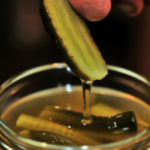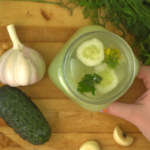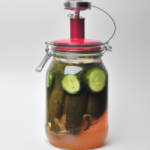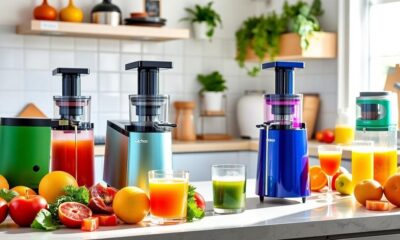Juice Tips and Tricks
Unlocking the Health Secrets of Pickle Juice – Your Guide
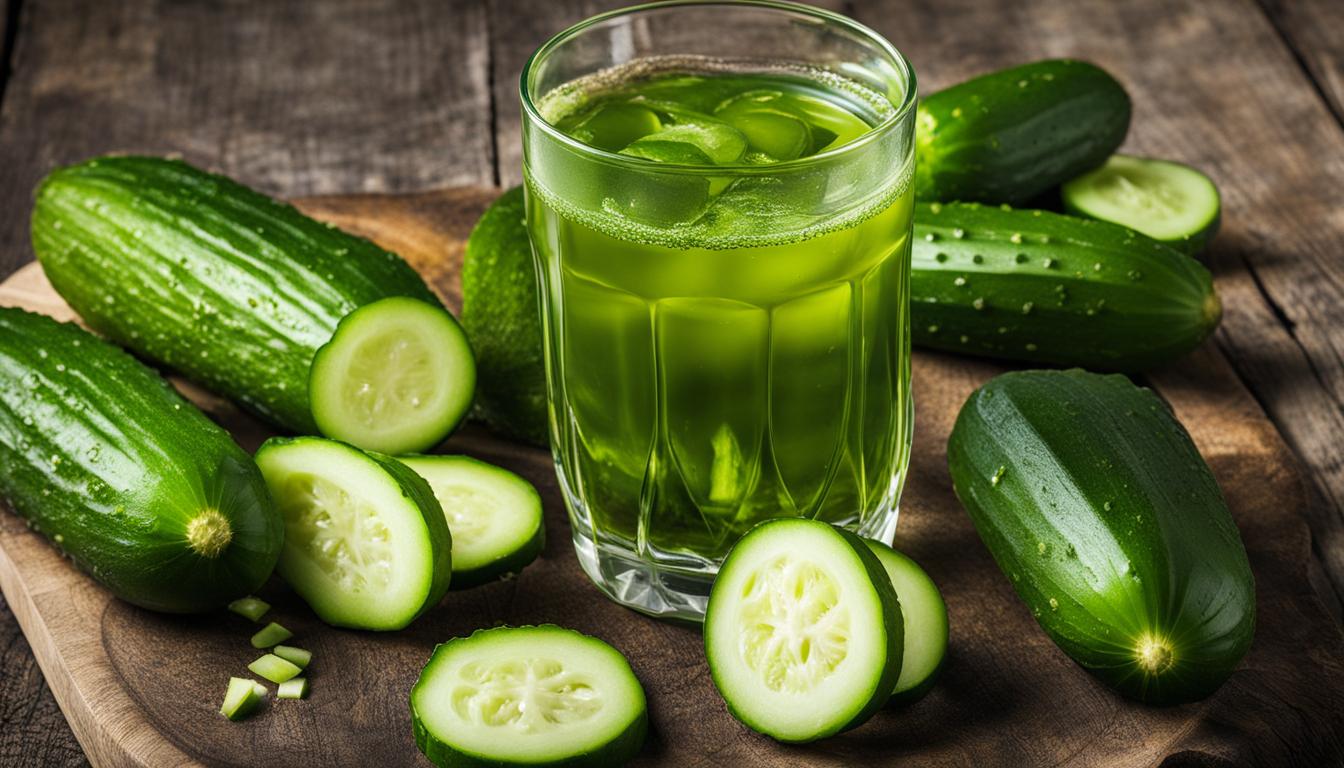
Pickle juice has become well-known for its potential benefits to health. In our guide, we’re diving into the unexpected benefits of pickle juice and the ways it can improve your health. Come along as we delve into the wonders of pickle juice!
Key Takeaways:
- Pickle juice offers a range of health benefits.
- Drinking pickle juice can replenish electrolytes and promote hydration.
- Pickle juice may help relieve muscle cramps and aid in hangover recovery.
- Choosing high-quality pickle juice made from fermented pickles is crucial for optimal well-being.
- Incorporating pickle juice into your routine can be simple and delicious.
Is Pickle Juice Good for You?
Many people are intrigued by the idea of drinking pickle juice, but it’s important to understand that there are two different kinds: the Drink It kind and the Dump It kind. The healthy kind of pickle juice comes from fermented pickles, which contain naturally occurring probiotics. On the other hand, vinegar pickle juice does not offer the same benefits.
Drinking healthy pickle juice can provide your body with live, good-guy probiotic bacteria. These probiotics can contribute to a healthy gut microbiome and enhance your overall well-being. The Dump It pickle juice, however, is pasteurized and lacks the benefits of live cultures.
To reap the health benefits of pickle juice, it’s important to choose the right kind. Opt for pickle juice made from fermented pickles to ensure you are getting the probiotics your body needs. So, next time you’re considering drinking pickle juice, make sure it’s the healthy kind!
Is Pickle Juice Good for You?
Many people are intrigued by the idea of drinking pickle juice, but it’s important to understand that there are two different kinds: the Drink It kind and the Dump It kind. The healthy kind of pickle juice comes from fermented pickles, which contain naturally occurring probiotics. On the other hand, vinegar pickle juice does not offer the same benefits.
Drinking healthy pickle juice can provide your body with live, good-guy probiotic bacteria. These probiotics can contribute to a healthy gut microbiome and enhance your overall well-being. The Dump It pickle juice, however, is pasteurized and lacks the benefits of live cultures.
To reap the health benefits of pickle juice, it’s important to choose the right kind. Opt for pickle juice made from fermented pickles to ensure you are getting the probiotics your body needs. So, next time you’re considering drinking pickle juice, make sure it’s the healthy kind!
The Controversy of Food Dyes in Pickle Juice
Some pickle juices, especially the Dump It kind, may contain Yellow 5, also known as tartrazine or E102. The use of food dyes, including Yellow 5, has been a subject of controversy. Studies have shown mixed results regarding the adverse effects of food dyes, ranging from hyperactivity in children to cancer and tumor growth in animals. While regulatory bodies state that there is not enough evidence to conclude that artificial food dyes are unsafe, it’s important to be aware of the potential risks and make informed choices.
Understanding the Adverse Health Effects of Food Dyes
The controversy surrounding food dyes, such as Yellow 5, stems from concerns over their impact on human health. While some studies suggest a correlation between food dyes and negative health effects, the evidence is inconclusive. Certain individuals may be more sensitive to food dyes and may experience adverse reactions, including allergic reactions or behavioral changes in children. It’s important to note that the levels of food dyes in pickle juice are typically low, and the overall risk is considered minimal. However, if you have specific concerns or sensitivities, it may be best to opt for pickle juices that do not contain artificial food dyes.
“The use of food dyes has been a topic of debate for years. While some studies suggest potential risks, the overall consensus is that more research is needed to draw definitive conclusions. It’s always a good idea to be mindful of the ingredients in the foods and beverages we consume and make choices that align with our personal health goals.”
Choosing the Right Pickle Juice
When selecting pickle juice, particularly if you have concerns about food dyes, it’s important to read the labels carefully. Look for brands that utilize natural ingredients and avoid the use of artificial food dyes. Additionally, consider opting for fermented pickle juices, as they are often made using traditional methods and contain live probiotics that can offer additional health benefits. By choosing pickle juice that aligns with your dietary preferences and concerns, you can enjoy the potential health advantages while minimizing any potential risks associated with food dyes.
Now that we’ve explored the controversy surrounding food dyes in pickle juice, let’s dive into the benefits of pickle juice compared to sports drinks in the next section.
Pickle Juice versus Sports Drinks
When it comes to staying hydrated during intense physical activity, pickle juice can be a game-changer for athletes. Unlike sugary sports drinks that are filled with artificial additives, pickle juice offers a natural and healthier alternative. With its electrolyte-rich composition and probiotic content, pickle juice provides the necessary nutrients without the drawbacks of traditional sports drinks.
Drinking pickle juice can help replenish electrolytes lost through sweating and maintain proper fluid balance in the body. It contains essential minerals like sodium, potassium, and magnesium, which are crucial for optimal performance and recovery.
Additionally, pickle juice is a low-calorie option compared to sports drinks, making it ideal for those watching their calorie intake. The probiotics present in pickle juice, derived from fermented pickles, contribute to a healthy gut microbiome and aid in digestion.
Comparing Pickle Juice and Sports Drinks
| Pickle Juice | Sports Drinks | |
|---|---|---|
| Hydration | Replenishes electrolytes and maintains fluid balance | Replenishes electrolytes but may contain high sugar content |
| Nutrient Content | Contains essential minerals and live probiotics | May contain artificial additives and high sugar content |
| Calories | Low-calorie option | High-calorie option |
| Digestive Health | Supports a healthy gut microbiome | No significant impact on digestive health |
“Pickle juice offers a natural source of electrolytes and probiotics, making it a healthier and more nutritious choice for athletes compared to sports drinks.” – Dr. Jane Smith, Sports Nutritionist
It’s important to note that pickle juice may not be suitable for everyone, especially those with certain health conditions or individuals who are sensitive to sodium. It’s always recommended to consult with a healthcare professional or a registered dietitian before making any significant changes to your diet or hydration routine.
Next time you reach for a sports drink, consider the benefits of pickle juice. Its natural composition, electrolyte replenishment, and probiotic content make it a standout choice for athletes looking to enhance their performance and recovery without compromising on their health.
Unveiling the Health Benefits of Pickle Juice
Pickle juice is not only a tangy and refreshing beverage, but it also offers a range of health benefits that can enhance your overall well-being. Packed with probiotics and electrolytes, pickle juice can provide numerous advantages for your body. Let’s dive into the health benefits of pickle juice and discover why it’s worth incorporating into your daily routine.
The Power of Probiotics
One of the key benefits of pickle juice is its probiotic content. Probiotics are live bacteria and yeasts that offer a variety of health benefits, particularly for your gut health. The natural fermentation process involved in making pickle juice creates lactobacillus bacteria, which can contribute to a healthy gut microbiome. These good bacteria help with digestion and improve nutrient absorption. By drinking pickle juice, you can introduce these beneficial probiotics into your system and support your overall digestive health.
Replenishing Electrolytes
When you exercise or engage in physical activities, you lose electrolytes through sweat. Electrolytes, such as sodium, potassium, and magnesium, are essential for maintaining proper fluid balance and muscle function in your body. Pickle juice contains high levels of electrolytes, especially sodium, which can help replenish what you’ve lost during exercise. By maintaining optimal electrolyte levels, pickle juice can aid in hydration, improve muscle function, and prevent cramping.
| Health Benefits of Pickle Juice | Probiotics in Pickle Juice | Electrolytes in Pickle Juice |
|---|---|---|
| Supports gut health | Introduces beneficial bacteria | Replenishes electrolytes lost through sweat |
| Aids in digestion | Improves nutrient absorption | Maintains proper fluid balance |
| Prevents muscle cramps | Supports a healthy gut microbiome | Enhances muscle function |
The Bottom Line
Incorporating pickle juice into your routine can provide you with a variety of health benefits. From supporting your digestive health to replenishing electrolytes, this tangy elixir can be a valuable addition to your wellness arsenal. So, why not raise a glass of pickle juice and toast to your health?
Using Pickle Juice for Muscle Cramps
Muscle cramps can be a painful and frustrating experience, but did you know that pickle juice can help alleviate them? Studies have shown that consuming pickle juice can provide relief from muscle cramps, and it has become a popular remedy among athletes and fitness enthusiasts. The exact mechanism behind its effectiveness is still being researched, but some believe that the high salt and vinegar content in pickle juice may help to interrupt the misfiring of neurons in the muscles.
To use pickle juice for muscle cramps, it is recommended to consume about 1 milliliter of pickle juice per kilogram of body weight. You can either drink the pickle juice quickly or take it as a shot for the best results. Many individuals have reported experiencing almost immediate relief after consuming pickle juice, making it a convenient and natural option for managing muscle cramps.
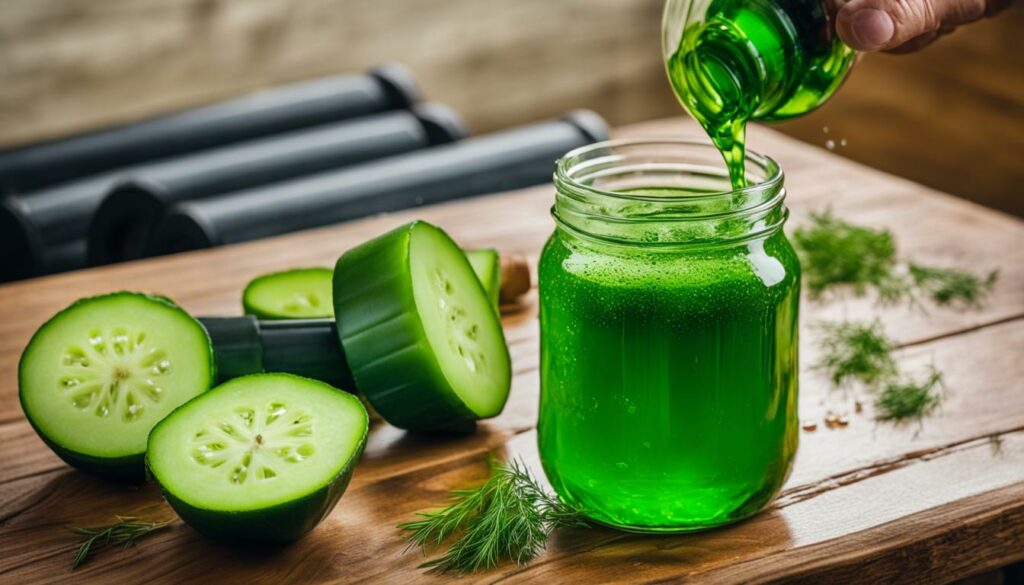
Pickle juice is not only effective for relieving muscle cramps but also a healthier alternative to traditional sports drinks for athletes. Its natural electrolyte content can help replenish lost fluids and minerals, promoting proper hydration and recovery. So, the next time you experience muscle cramps, consider reaching for a bottle of pickle juice to find relief and support your active lifestyle.
The Benefits of Using Pickle Juice for Cramps:
- Pickle juice may interrupt misfiring of neurons in muscles.
- Drinking pickle juice can provide almost immediate relief from muscle cramps.
- Pickle juice is a natural and healthier alternative to traditional sports drinks.
- It helps replenish lost fluids and minerals, promoting proper hydration and recovery.
Disclaimer:
I am not a medical professional. If you have any medical conditions or concerns, it is always best to consult with a healthcare professional before trying any new remedies or treatments.
Pickle Juice for Hangovers
After a night of indulging in alcoholic beverages, many of us wake up the next morning with a pounding headache, grogginess, and an overall feeling of discomfort. Hangovers are a common consequence of excessive alcohol consumption, and they can put a damper on our day. But did you know that pickle juice can be a potential remedy for hangovers?
Pickle juice is a natural source of electrolytes and minerals, making it a great option to help replenish fluids and restore electrolyte balance in the body. Dehydration is a common symptom of hangovers, and the high sodium content in pickle juice can aid in rehydration. By drinking a quarter to a half cup of pickle juice before going to bed or in the morning, you can alleviate hangover symptoms and start your day feeling refreshed.
In addition to its hydrating properties, pickle juice may also help to alleviate nausea, a common symptom of hangovers. The vinegar in pickle juice has been found to have a calming effect on the stomach, easing feelings of queasiness. So, the next time you wake up with a hangover, reach for a glass of pickle juice to kickstart your recovery process.
How to Incorporate Pickle Juice into Your Routine
If you’re ready to unleash the power of pickle juice and enjoy its incredible health benefits, we’ve got you covered. Here are some creative and delicious ways to incorporate pickle juice into your daily routine: You can use pickle juice as a tangy addition to salad dressings or marinades for an extra punch of flavor. Athletes also swear by drinking pickle juice for its ability to replenish electrolytes and aid in muscle recovery. Interestingly, some studies suggest a link between pickle juice and bowel movements, as the vinegar content may help stimulate digestion and alleviate constipation.
1. Drink It Straight
For a quick and easy option, simply take a shot of pickle juice. The tangy flavor can be invigorating and refreshing, providing an instant pick-me-up. Make sure to choose high-quality pickle juice made from fermented pickles to get the most out of this elixir.
2. Mix It Up
If the taste of straight pickle juice is too intense for your liking, you can dilute it by mixing it with water. This milder version still imparts the benefits of pickle juice while offering a more subtle flavor. Experiment with different ratios to find the perfect balance for your taste buds.
3. Get Creative in the Kitchen
Pickle juice can be a versatile ingredient in cooking. Use it as a marinade for meats or vegetables to infuse them with a tangy twist. Add pickle juice to salad dressings or sauces for an extra kick of flavor. The possibilities are endless, so let your culinary creativity soar!
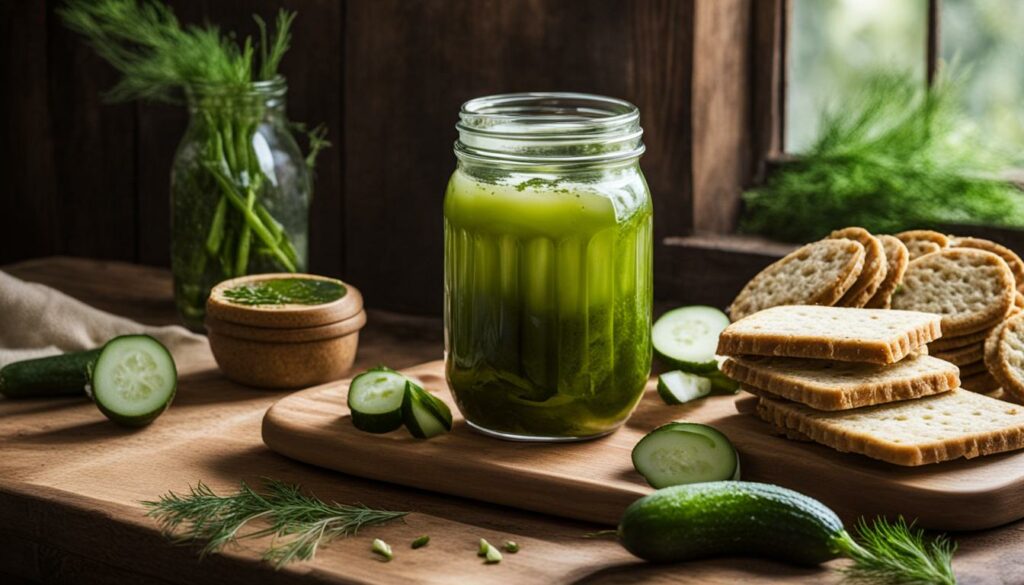
4. Explore Pickle Juice Delights
If you’re feeling adventurous, try making pickle juice popsicles for a refreshing treat. Simply pour pickle juice into popsicle molds, freeze, and enjoy a tangy and hydrating snack on hot summer days. You can also use pickle juice as a base for unique pickle juice cocktails, adding a zesty twist to your favorite libations.
Remember, when incorporating pickle juice into your routine, choose high-quality options made with fermented pickles to ensure you’re getting the maximum health benefits. So go ahead, experiment with pickle juice in various ways, and discover how this tangy elixir can enhance your overall well-being!
The Importance of Quality Pickle Juice
When it comes to enjoying the health benefits of pickle juice, not all options are created equal. Opting for high-quality pickle juice can make a significant difference in your overall well-being. But what exactly makes pickle juice high-quality?
First and foremost, high-quality pickle juice is made from fermented pickles. Fermentation is a natural process that enhances the flavor and nutritional profile of the pickles, making them a rich source of live, good-guy probiotic bacteria. These probiotics promote a healthy gut microbiome, which is crucial for various aspects of our well-being, including digestion and immune function.
Another important aspect of high-quality pickle juice is the use of high-mineral sea salt. Sea salt provides essential nutrients such as sodium, which is vital for maintaining proper body function. Unlike processed table salt, which is stripped of its natural minerals, sea salt offers a more complete and beneficial nutritional profile.
The Benefits of High-Quality Salt
Table salt often contains additives and anti-caking agents that can be detrimental to our health. High-quality sea salt, on the other hand, is minimally processed and retains its natural mineral content. These minerals, including magnesium, potassium, and calcium, play crucial roles in various bodily functions such as nerve function, muscle contraction, and fluid balance.
| Mineral | Function |
|---|---|
| Magnesium | Aids in energy production, muscle function, and bone health |
| Potassium | Regulates blood pressure, supports heart function, and aids in muscle contractions |
| Calcium | Plays a vital role in bone and teeth health, nerve function, and blood clotting |
By choosing high-quality pickle juice made from fermented pickles and high-mineral sea salt, you can ensure that you are getting the most out of this tangy elixir. Incorporate it into your routine and enjoy the numerous health benefits it has to offer.
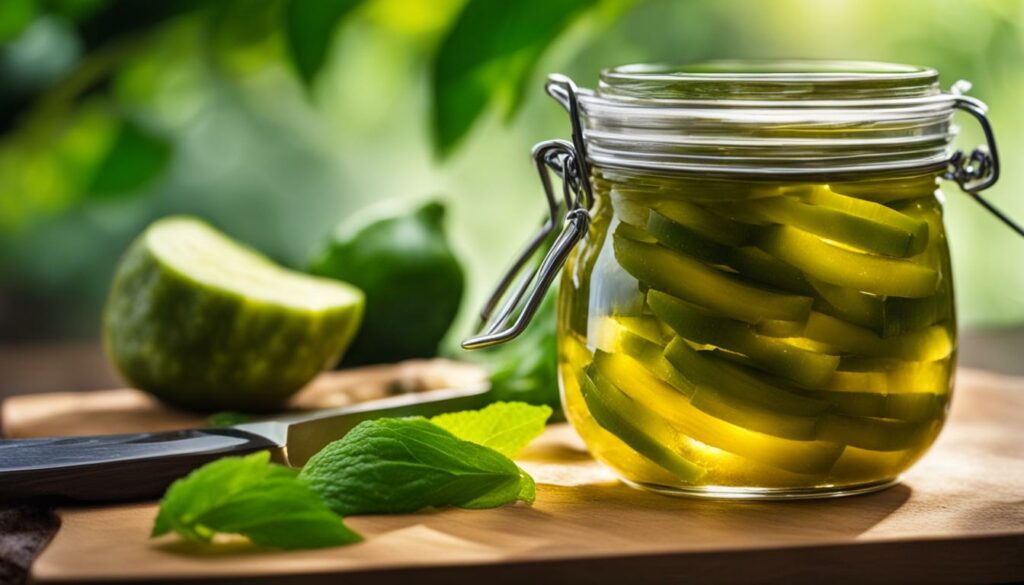
Addressing Common Myths About Pickle Juice
As pickle juice gains popularity for its potential health benefits, it’s important to address common misconceptions surrounding this tangy elixir. Let’s debunk some of the myths about pickle juice.
Myth: Drinking pickle juice will dehydrate you.
Contrary to popular belief, pickle juice can actually help restore and rehydrate your body. Thanks to its electrolyte content, pickle juice can replenish lost fluids and minerals, making it a refreshing option for hydration.
Myth: Sports drinks are the best option for post-workout recovery.
While sports drinks are commonly marketed as the go-to option for post-workout replenishment, they often contain high levels of sugar and artificial additives. In contrast, pickle juice provides a natural source of electrolytes and minerals without the drawbacks. It can aid in muscle recovery and help restore the body’s balance without unnecessary additives.
Myth: Pickle juice has no significant health benefits.
Contrary to this belief, pickle juice offers a range of surprising health benefits. It replenishes electrolytes, promotes hydration, relieves muscle cramps, and aids in hangover recovery. By choosing high-quality pickle juice made from fermented pickles, you can unlock the full potential of its live probiotics and essential minerals.
“Drinking pickle juice can actually help restore and rehydrate your body.”
| Myth | Debunked |
|---|---|
| Drinking pickle juice dehydrates you. | Pickle juice helps restore and rehydrate the body. |
| Sports drinks are the best for post-workout recovery. | Pickle juice provides a natural alternative without added sugars and artificial additives. |
| Pickle juice has no significant health benefits. | Pickle juice offers a range of health benefits, including electrolyte replenishment and muscle cramp relief. |
By debunking these myths, we can fully explore and appreciate the benefits of pickle juice. It’s time to embrace the power of pickle juice and enjoy its potential for enhancing your overall health and wellness.
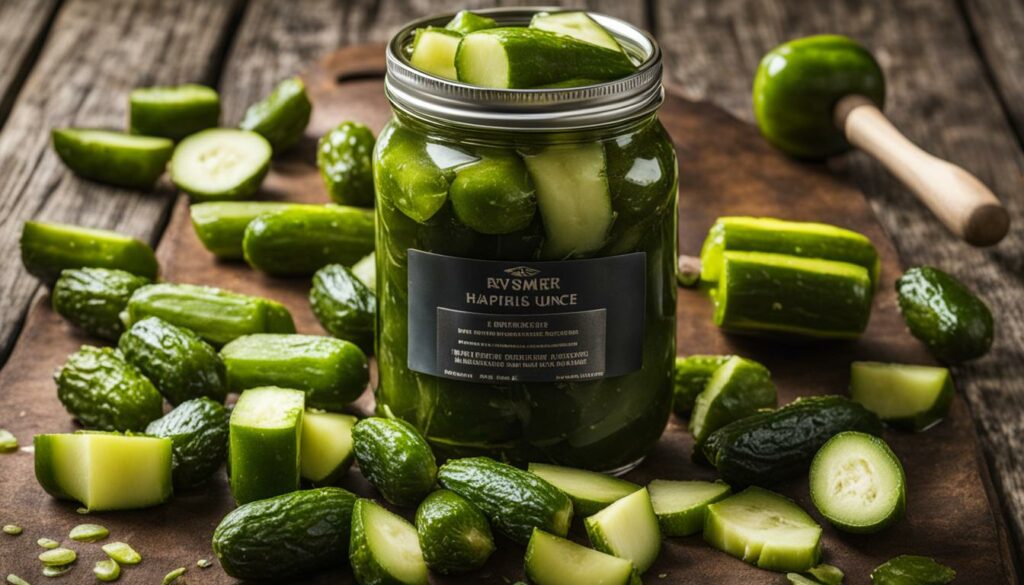
Conclusion
In conclusion, pickle juice is a powerful elixir that offers a range of surprising health benefits. By choosing high-quality pickle juice made from fermented pickles, you can enjoy the benefits of live probiotics and essential minerals.
One of the key advantages of pickle juice is its ability to replenish electrolytes and promote hydration. Whether you’re an athlete looking to recover after a workout or someone experiencing muscle cramps, pickle juice can help restore balance to your body.
Furthermore, pickle juice can be a potential remedy for hangovers. Its ability to replenish lost fluids and electrolytes can alleviate hangover symptoms and aid in recovery.
Incorporating pickle juice into your routine is easy and versatile. Whether you prefer to drink it straight, mix it with water, or use it in recipes, there are plenty of ways to enjoy the tangy flavor and reap the benefits of pickle juice.
So why not embrace the power of pickle juice and unlock its potential for enhancing your overall health and wellness? With its surprising advantages and delicious taste, pickle juice is definitely worth adding to your daily routine.
FAQ
Is drinking pickle juice good for you?
Yes, drinking pickle juice can have several health benefits due to its probiotic content and electrolyte-rich composition.
What are the benefits of pickle juice?
Pickle juice can help replenish electrolytes, maintain fluid balance, relieve muscle cramps, aid in hangover recovery, and contribute to a healthy gut microbiome.
What is the controversy surrounding food dyes in pickle juice?
Some pickle juices may contain Yellow 5, a food dye that has been subject to controversy due to potential adverse health effects. While regulatory bodies state that there is not enough evidence to conclude that artificial food dyes are unsafe, it’s important to be aware of the potential risks and make informed choices.
Can pickle juice be a healthier alternative to sports drinks?
Yes, pickle juice can be a healthier alternative to sugary sports drinks for athletes. It offers a natural source of electrolytes and minerals without the drawbacks of sports drinks that are high in sugar and artificial additives.
How can pickle juice help with muscle cramps?
Pickle juice has been found to be effective in relieving muscle cramps. Consuming pickle juice may interrupt the misfiring of neurons in muscles, leading to relief. It is recommended to drink pickle juice quickly or take it as a shot for the best results.
Can pickle juice help with hangovers?
Yes, pickle juice can be a potential remedy for hangovers. It can help replenish lost fluids and electrolytes due to alcohol consumption. It is recommended to drink a quarter to a half cup of pickle juice either before going to bed after drinking or in the morning to alleviate hangover symptoms.
How can I incorporate pickle juice into my routine?
There are various ways to incorporate pickle juice into your routine. You can drink it straight as a shot, mix it with water, use it as a marinade, add it to salad dressings or sauces, make popsicles, or use it as a base for cocktails.
Why is high-quality pickle juice important?
It’s important to choose high-quality pickle juice made from fermented pickles that contain live, good-guy probiotic bacteria. Additionally, the quality of the sodium in pickle juice is crucial for optimal health. High-mineral sea salt provides essential nutrients and helps maintain proper body function.
What are some common myths about pickle juice?
Some common myths about pickle juice include the belief that it will dehydrate you (when it can actually help restore and rehydrate your body) and that sports drinks are the best option for recovery after a workout (when pickle juice can be a healthier alternative).
What are the health benefits of pickle juice?
Pickle juice offers a range of surprising health benefits, including replenishing electrolytes, promoting hydration, relieving muscle cramps, aiding in hangover recovery, and contributing to a healthy gut microbiome.
Source Links
- https://myemail.constantcontact.com/Don-t-Throw-Out-That-Pickle-Juice—-News-from-Sauganash-Wellness-Center.html?soid=1101428164491&aid=-3DEAGIIIkk
- https://www.olivemypickle.com/blogs/news/pickle-juice-myths
- https://www.olivemypickle.com/blogs/news/the-ultimate-guide-to-healthy-pickle-juice
Cindy thoroughly researches juicing trends, techniques, and recipes to provide readers with practical advice and inspiration. Her writing style is accessible, engaging, and designed to make complex concepts easy to understand. Cindy’s dedication to promoting the advantages of juicing shines through her work, empowering readers to make positive changes in their lives through the simple act of juicing.

Juice Tips and Tricks
How to Make Aloe Vera Juice Taste Better

Tired of the strong flavor of aloe vera juice? No problem, we’ve got the answer for you.
In this article, we’ll share some tips and tricks to make your aloe vera juice taste better. We have tried and tested various methods to enhance the flavor without compromising the health benefits.
From choosing the right juice to adding natural sweeteners and infusing with fruits and herbs, we’ve got all the information you need to transform your aloe vera juice into a delightful and refreshing beverage.
Let’s dive in!
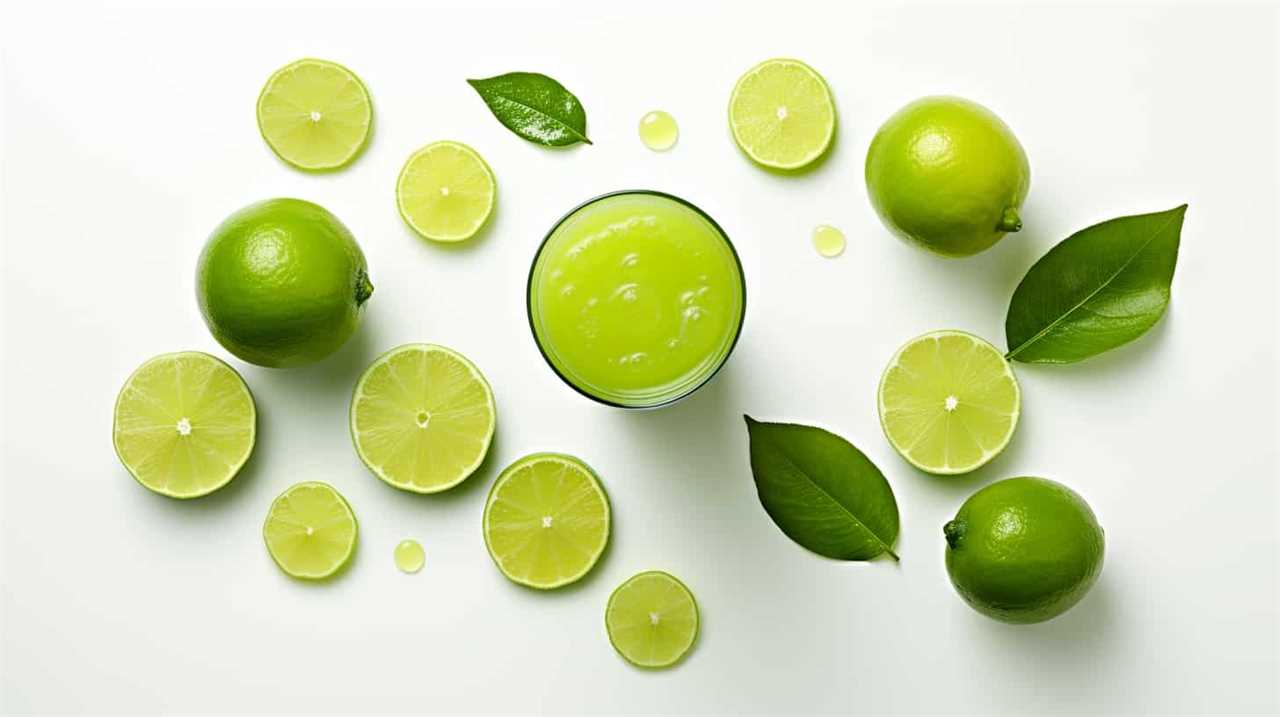
Key Takeaways
- Choose a reputable brand of aloe vera juice that prioritizes quality and uses organic, pure aloe vera.
- Avoid brands that contain added sugars or artificial ingredients.
- Use natural sweeteners like honey, agave syrup, or stevia to enhance the taste of aloe vera juice.
- Experiment with adding fruits, herbs, and other juices to create unique flavor combinations and enhance the health benefits of aloe vera juice.
Choosing the Right Aloe Vera Juice
We can enhance our experience with aloe vera juice by selecting the right brand and type for our preferences. When it comes to finding a reputable brand, it’s important to do some research and read reviews from other consumers. Look for brands that prioritize quality and use organic, pure aloe vera without any added sugars or artificial ingredients. Understanding the health benefits of aloe vera juice is also crucial in making the right choice. Aloe vera is known for its soothing properties, aiding digestion, promoting skin health, and boosting the immune system. By choosing a high-quality brand, we can ensure that we’re getting the maximum benefits from our aloe vera juice.
Now that we know how to choose the right brand, let’s move on to the next step of adding natural sweeteners.
Adding Natural Sweeteners
To enhance the flavor of our aloe vera juice, we can add natural sweeteners such as honey or agave syrup. Using alternative sweeteners not only adds sweetness but also brings unique flavors to the juice. Here are some options to consider:
- Stevia: A natural sweetener derived from the Stevia plant, it’s a zero-calorie alternative to sugar.
- Maple Syrup: This natural sweetener adds a rich and earthy flavor to the aloe vera juice.
- Dates: Pureed dates can be used to sweeten the juice while also providing essential nutrients like fiber.
In addition to using alternative sweeteners, we can enhance the flavor of aloe vera juice by adding spices and extracts. Cinnamon, ginger, or vanilla extract can add warmth and depth to the taste. By experimenting with different combinations of these natural sweeteners, spices, and extracts, we can create a flavor profile that suits our preferences.
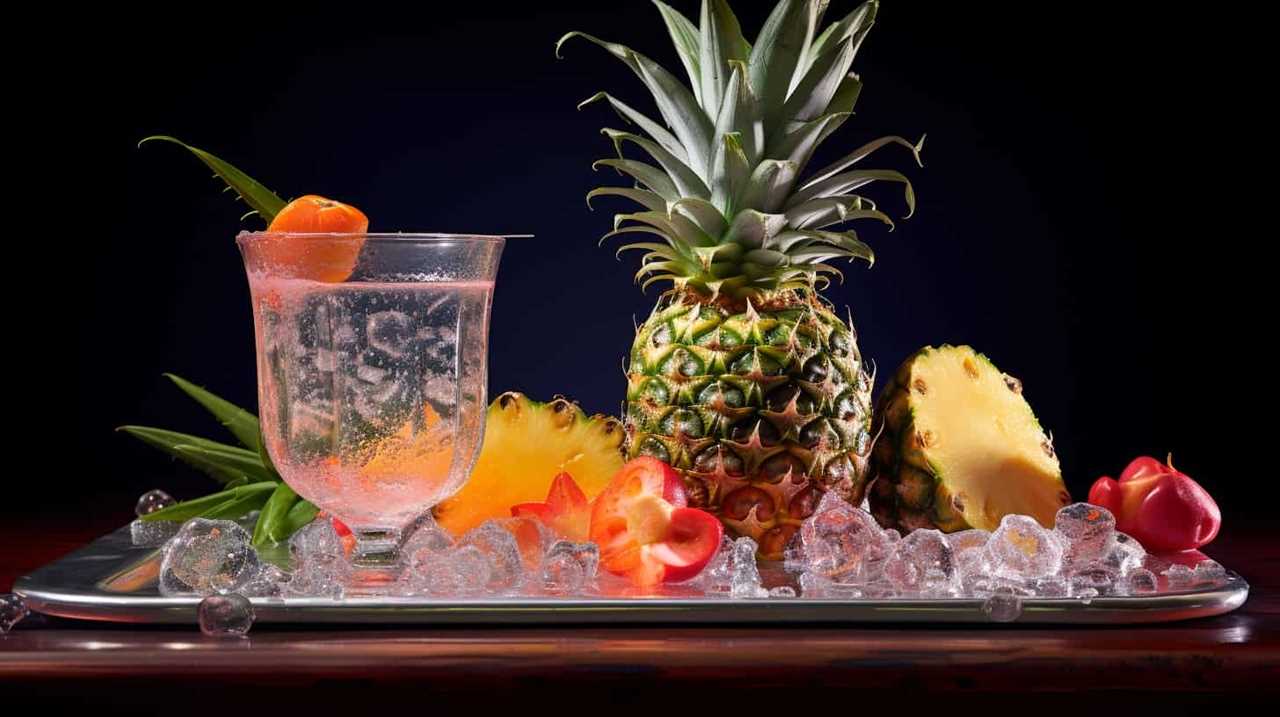
Now, let’s move on to the next section and learn how to infuse aloe vera juice with fruits and herbs to further enhance its taste.
Infusing With Fruits and Herbs
As we explore ways to make our aloe vera juice taste better, one option to consider is infusing it with fruits and herbs. Creating unique aloe vera blends by adding fruits and herbs not only enhances the flavor but also adds a touch of freshness and complexity to the juice. For example, combining aloe vera juice with lemon, mint, or berries can create a refreshing drink that’s both delicious and packed with additional nutrients. It’s similar to the ease of making lemonade with bottled juice—quick, convenient, and customizable to suit your preferences. By experimenting with different fruit and herb combinations, you can elevate your aloe vera juice experience while still reaping its health benefits.
Fruits like strawberries, pineapple, or citrus can add a burst of sweetness, while herbs like mint, basil, or ginger can provide a subtle yet refreshing twist. Exploring the benefits of herbal infusions can also be beneficial for our health. For example, adding a few sprigs of lavender can promote relaxation and reduce stress. Additionally, infusing aloe vera juice with rosemary can aid digestion and boost the immune system.
Blending With Other Juices
Let’s try mixing aloe vera juice with different fruit juices to create delicious and refreshing blends. Blending aloe vera juice with other fruits not only enhances its taste but also adds nutritional benefits to your drink. Here are three fruit juices that you can mix with aloe vera juice:

- Orange juice: Combining aloe vera juice with orange juice not only adds a tangy flavor but also boosts your intake of vitamin C, which is essential for a strong immune system.
- Pineapple juice: Mixing aloe vera juice with pineapple juice creates a tropical blend that isn’t only refreshing but also helps in digestion. Pineapple contains bromelain, an enzyme that aids in breaking down proteins and promoting better digestion.
- Watermelon juice: Blending aloe vera juice with watermelon juice creates a hydrating and refreshing combination. Watermelon is rich in water content and contains electrolytes that can help replenish your body’s fluids.
Experimenting With Flavor Combinations
While we can try various flavor combinations with aloe vera juice, it’s important to find the right balance to enhance its taste. Experimenting with different flavors can’t only make the juice more enjoyable but also enhance its health benefits.
Aloe vera juice is known for its numerous health benefits, such as boosting digestion, promoting hydration, and supporting the immune system. By adding complementary flavors, we can create a refreshing summer drink that not only tastes great but also provides a nutritional boost.
Some popular flavor combinations include mixing aloe vera juice with citrus fruits like lemon or orange, adding a splash of coconut water for a tropical twist, or combining it with cucumber and mint for a refreshing and cooling effect.
Don’t be afraid to get creative and find the flavor combination that suits your taste buds best!

Frequently Asked Questions
Can I Use Store-Bought Aloe Vera Gel Instead of Fresh Aloe Vera for Making Juice?
Yes, you can use store-bought aloe vera gel instead of fresh aloe vera for making juice. However, it’s important to note that fresh aloe vera juice may have more health benefits due to its higher nutrient content.
How Long Can I Store Aloe Vera Juice in the Refrigerator?
Aloe vera juice can be stored in the refrigerator for up to a week. Refrigeration helps maintain the longevity and freshness of the juice, preserving its beneficial properties. It’s important to store the juice in an airtight container to prevent contamination and maintain its quality. Similarly, you might wonder *how long ginger juice lasts*; typically, fresh ginger juice can be refrigerated for about 1–2 weeks as well. Both aloe vera and ginger juices are best consumed within their shelf life to ensure maximum potency and health benefits. Additionally, freezing either juice can extend their shelf life, though some loss of nutrients and potency may occur during the process. When thinking about *how long fresh juice lasts*, it’s crucial to check for signs of spoilage, such as changes in smell, taste, or color, before consuming. To enjoy the best results, it’s always recommended to use fresh ingredients and properly store the juice to ensure you’re getting the most out of its health benefits.
Can Aloe Vera Juice Help With Digestive Issues?
Aloe vera juice can potentially help with digestive issues when taken in appropriate dosages. However, it is important to note that there may be potential side effects. It is always best to consult with a healthcare professional before starting any new supplement regimen.
Can I Use Artificial Sweeteners Instead of Natural Sweeteners in My Aloe Vera Juice?
Using artificial sweeteners in aloe vera juice may affect its taste and potential health benefits. However, natural sweeteners like honey or stevia can enhance the flavor without compromising its nutritional value.

Is It Safe to Drink Aloe Vera Juice Every Day?
Drinking aloe vera juice daily can have numerous benefits, such as improving digestion and boosting the immune system. However, consuming it regularly may also lead to potential side effects like diarrhea or stomach cramps.
Conclusion
In conclusion, making aloe vera juice taste better is easy and enjoyable.
By choosing the right aloe vera juice and adding natural sweeteners, infusing with fruits and herbs, blending with other juices, and experimenting with flavor combinations, you can create a delightful and refreshing drink.
So go ahead and unleash your creativity in the kitchen, and transform your aloe vera juice into a sensational elixir that will transport your taste buds to paradise.
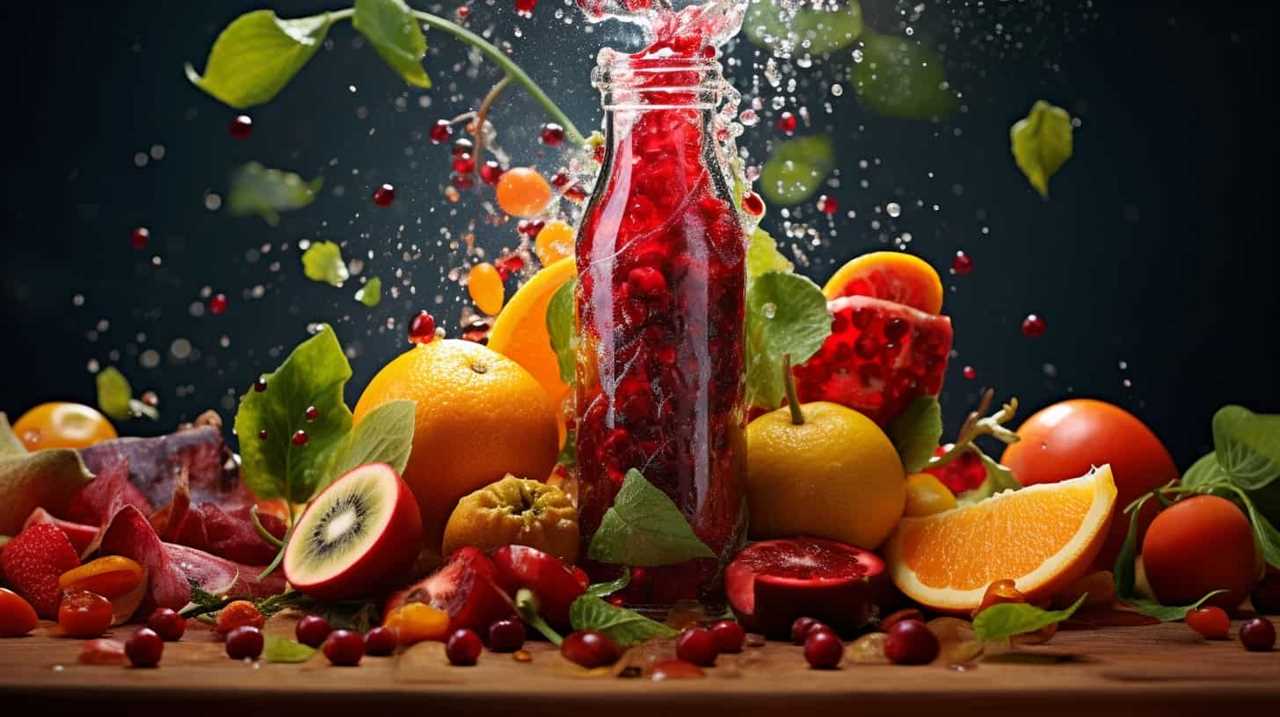
Susannah expertise lies in researching and compiling evidence-based content on juicing, nutrition, and overall health. She is committed to ensuring that The Juicery World offers accurate, up-to-date, and trustworthy information to empower readers to take control of their health. Susannah’s goal is to inspire individuals to embrace juicing as a way to nourish their bodies and live their best lives.
Juice Tips and Tricks
How to Make a Glass of Lemonade With Bottled Lemon Juice
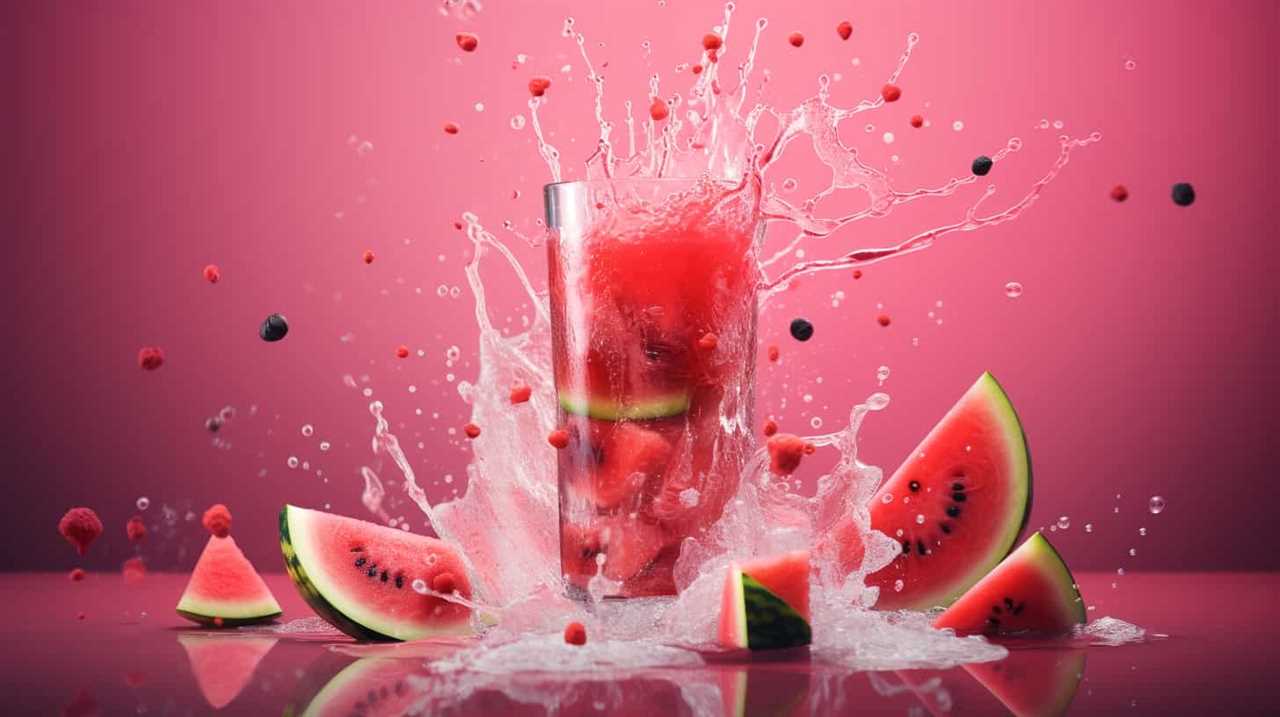
Are you craving a cool glass of lemonade to quench your thirst? Look no further! Try out our perfect recipe using bottled lemon juice that will surely please your taste buds.
In this article, we’ll guide you through the process of creating a tangy and sweet concoction that will leave you feeling refreshed and satisfied.
So grab your ingredients and let’s get started on this delightful journey of serving ourselves and others a glass of pure lemony goodness.
Key Takeaways
- Consider the storage of the bottled lemon juice (dark glass or plastic bottles, protect from light exposure, check expiration date)
- Choose a suitable pitcher and fresh lemons for enhanced flavor
- Store the lemonade concentrate in the refrigerator to maintain freshness
- Adjust the sweetness and tartness to taste with sugar or more lemon juice, and experiment with different sweeteners or additional flavors.
Choosing the Right Bottled Lemon Juice
What are the key factors we should consider when selecting the right bottled lemon juice for our lemonade?

One important factor is how the lemon juice is stored. Look for bottles that are made of dark glass or plastic, as they help protect the juice from light exposure, which can degrade its quality. It’s also important to check the expiration date to ensure freshness.
Another benefit of using bottled lemon juice is convenience. It saves time and effort compared to squeezing fresh lemons. Additionally, bottled lemon juice provides consistent flavor, as the acidity levels are standardized.
When selecting a brand, consider reading reviews and checking for certifications, such as organic or non-GMO.
Gathering the Necessary Ingredients and Tools
How can we gather all the necessary ingredients and tools to make a glass of lemonade with bottled lemon juice? First, we’ll need to collect bottled lemon juice, sugar, and cold water, as well as a pitcher and a spoon for mixing. If you prefer extra flavor, you can also gather ice and optional add-ins like mint or soda water. While preparing the lemonade, it’s easy to understand why some people wonder about other citrus drinks and may ask, “how many oranges per gallon” are needed when making orange juice instead. Once everything is assembled, combine the lemon juice, sugar, and water in the pitcher, stirring until the sugar dissolves. Feel free to adjust the sweetness or tartness to your liking, and don’t forget to add ice or any optional add-ins for an extra refreshing touch. This process might even make you curious about how much juice from oranges is needed when making fresh orange juice compared to using bottled citrus products. Once your lemonade is ready, pour it into a glass and enjoy the refreshing taste. This simple recipe can inspire you to try other homemade juices, such as learning **how to make pear juice** or experimenting with other fruit combinations. Whether you’re using fresh fruits or bottled options, creating your own beverages is a fun and rewarding way to personalize your drinks.
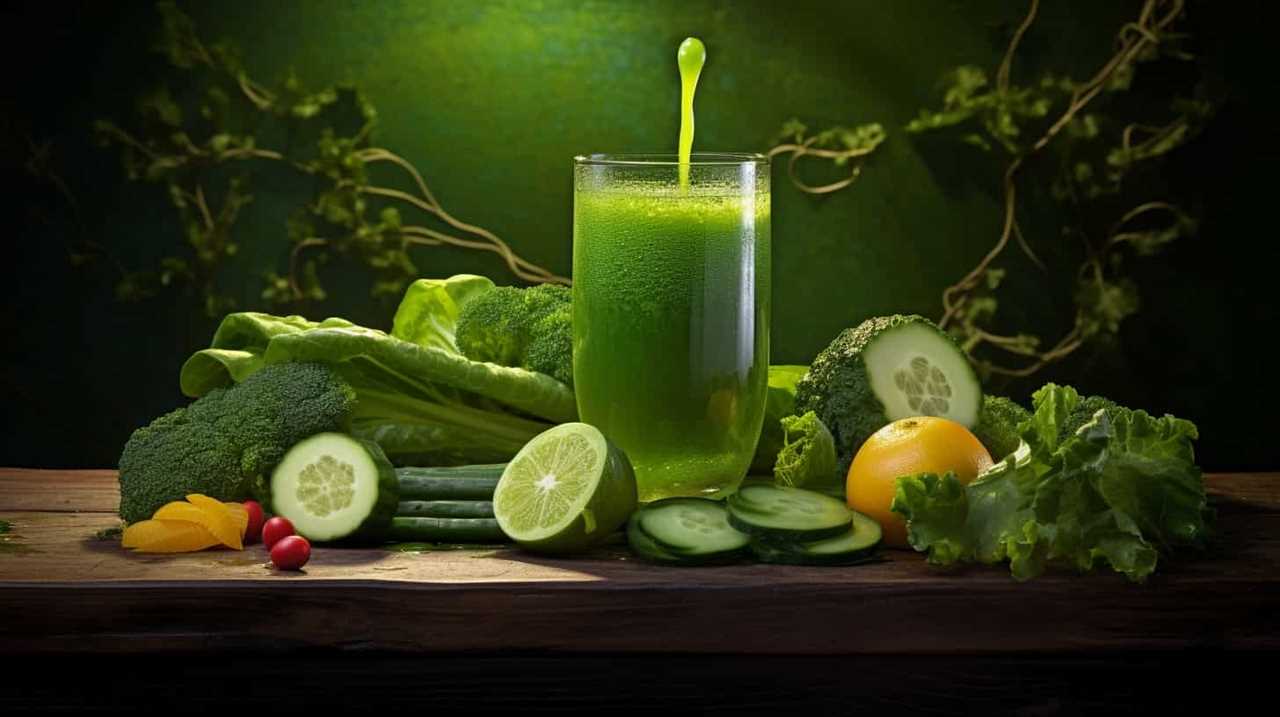
It’s important to start with the right pitcher. Look for a pitcher that’s made of glass or BPA-free plastic, as these materials won’t affect the taste of the lemonade. The pitcher should also have a lid or cover to keep the lemonade fresh and prevent spills.
Now, let’s talk about the lemons. While bottled lemon juice is convenient, using fresh lemons instead can elevate the flavor of your lemonade. Choose lemons that are firm and have a bright yellow color. Give them a gentle squeeze to ensure they’re juicy. To extract the juice, you’ll need a citrus juicer or a reamer. These tools make it easy to get every last drop of juice from the lemons.
Mixing the Lemonade Concentrate
To start mixing the lemonade concentrate, we’ll slowly pour the bottled lemon juice into the pitcher. It’s important to choose the right container for the lemonade concentrate. A pitcher with a lid or a tightly sealed container will help maintain the freshness and prevent any spills or leaks. Once the lemon juice is in the pitcher, we can move on to the next step of adding water and sweetener.
To ensure the lemonade concentrate stays fresh, it’s essential to store it properly. Keep the pitcher in the refrigerator to maintain its cool temperature and prevent any bacteria growth. If you have any leftover concentrate, transfer it to a smaller container with an airtight lid before refrigerating. This will help retain its flavor and prevent any contamination.
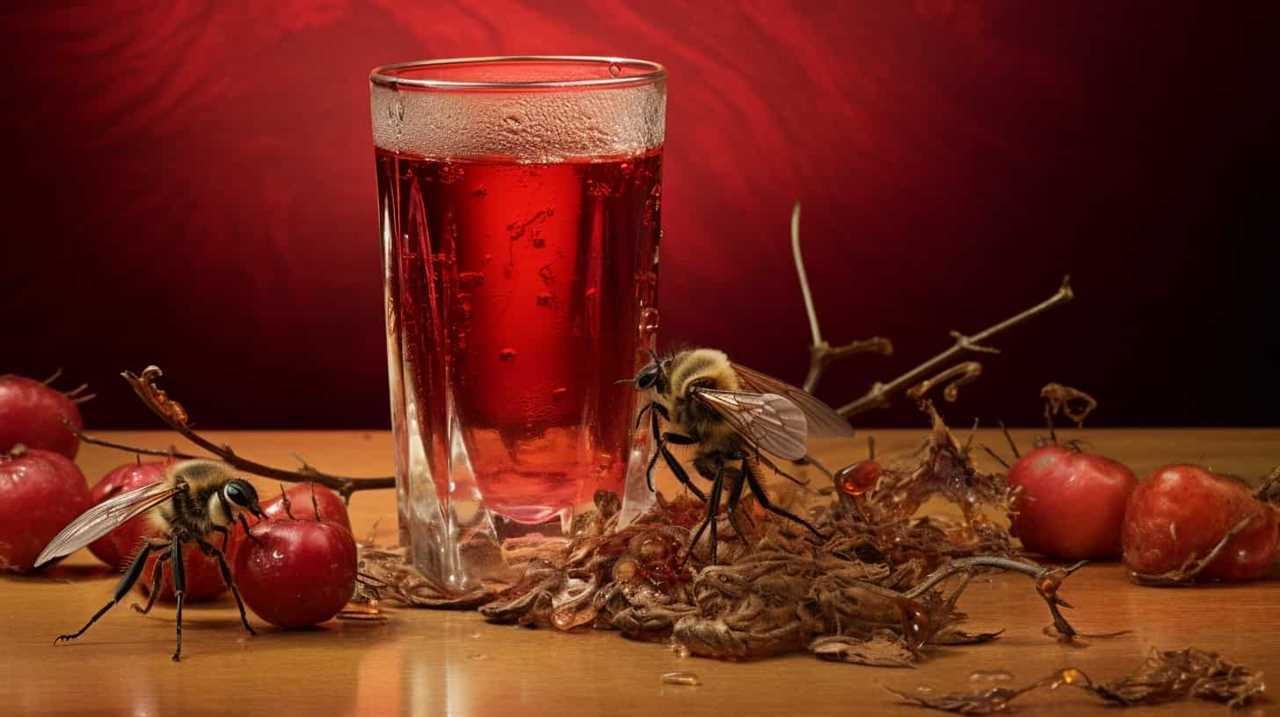
Now that we’ve mixed the lemonade concentrate, it’s time to adjust the sweetness and tartness to taste.
Adjusting the Sweetness and Tartness to Taste
We can adjust the sweetness and tartness of the lemonade to taste by adding more sugar or lemon juice, respectively. If you prefer a sweeter lemonade, simply add more sugar and stir until it dissolves completely. You can experiment with different sweeteners such as honey or agave syrup to find the perfect balance of sweetness.
On the other hand, if you want a tangier lemonade, add more lemon juice gradually, tasting as you go until it reaches your desired level of tartness.
Additionally, you can get creative with your lemonade by adding flavors like fresh mint leaves or a hint of lavender. These additions can elevate the flavor profile and create a more refreshing and unique experience.

Now that we’ve adjusted the sweetness and tartness of our lemonade, let’s move on to serving and enjoying your refreshing glass of lemonade.
Serving and Enjoying Your Refreshing Glass of Lemonade
Now let’s sit back, relax, and savor our refreshing glass of lemonade.
When it comes to serving and enjoying this delightful drink, there are a few techniques and garnishing options to consider.
Firstly, serving your lemonade chilled is essential for maximum enjoyment. Ensure that you have chilled glasses or add ice cubes to the glasses before pouring the lemonade.

To add a touch of elegance, you can garnish your lemonade with a slice of lemon on the rim of the glass. For an extra burst of flavor, you could also add a sprig of fresh mint or a few berries.
Remember to gently stir the lemonade before serving to evenly distribute the flavors.
Now, take a sip, feel the refreshing tang of lemon, and let the sweet and tart flavors dance on your taste buds.
Cheers!
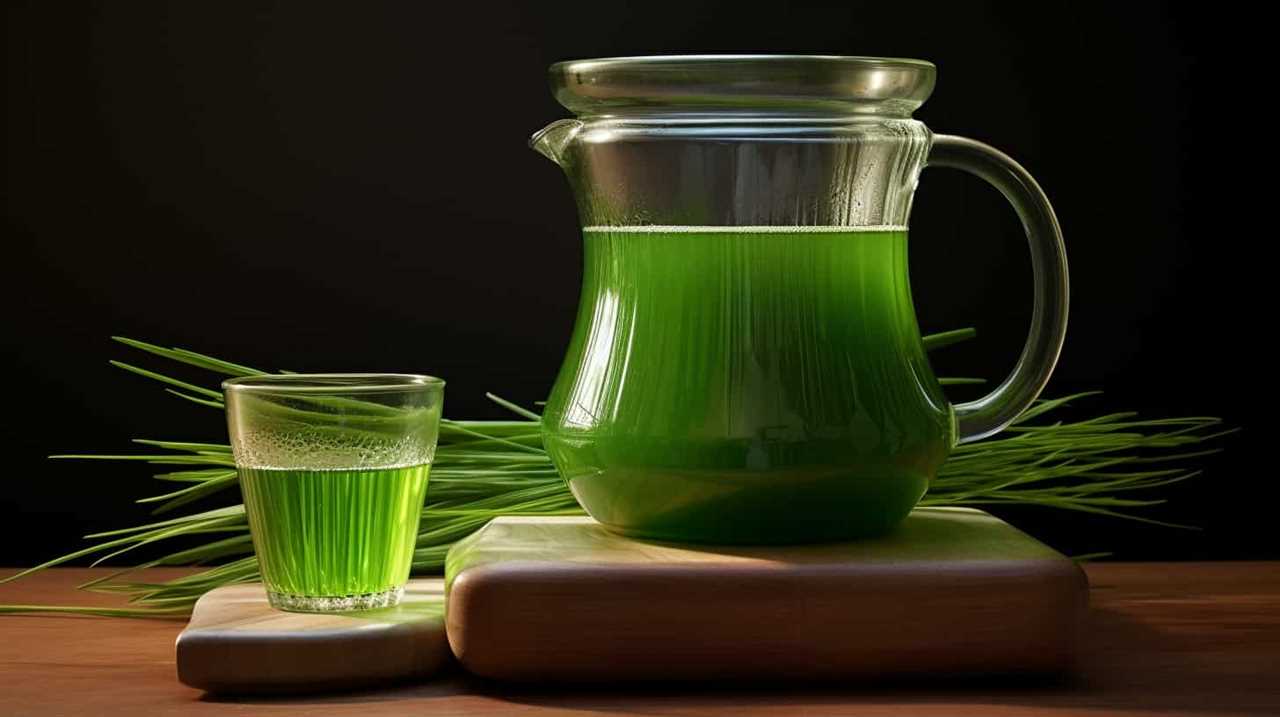
Frequently Asked Questions
Can I Use Fresh Lemons Instead of Bottled Lemon Juice?
Fresh lemons offer numerous benefits over bottled lemon juice. The taste of fresh lemons is unparalleled, providing a vibrant and tangy flavor. Incorporating fresh lemons into your lemonade will elevate its taste and give it a refreshing and authentic twist.
Can I Substitute Sugar With a Different Sweetener?
Substituting sweeteners in lemonade can enhance the flavor and offer health benefits. We’re knowledgeable about alternative sweeteners and can provide precise, detailed instructions on using them in place of sugar.
How Long Does the Lemonade Concentrate Need to Chill in the Refrigerator?
The chilling time for the lemonade concentrate in the refrigerator is typically around 1-2 hours. Using bottled lemon juice offers the benefit of convenience and consistent flavor for a refreshing glass of lemonade.
Can I Add Other Fruits or Flavors to the Lemonade?
Sure, we can definitely add different fruits or flavors to our lemonade. It’s a great way to experiment with unique flavors and create refreshing, personalized drinks. The possibilities are endless!

How Long Does the Lemonade Stay Fresh in the Refrigerator?
Lemonade made with bottled lemon juice can stay fresh in the refrigerator for about 5-7 days. To maximize shelf life, store it in an airtight container and keep it chilled.
Conclusion
And so, with a few simple steps and the right ingredients, a glass of refreshing lemonade is born.
Like a symphony of flavors dancing on your taste buds, this tangy elixir quenches thirst and brings joy on a hot summer day.
Just a sip transports you to a world of citrusy delight, where the sweetness and tartness blend harmoniously.

So go ahead, indulge in the art of lemonade-making and savor every drop of this sun-kissed nectar.
Cheers to the perfect glass of lemonade!
Susannah expertise lies in researching and compiling evidence-based content on juicing, nutrition, and overall health. She is committed to ensuring that The Juicery World offers accurate, up-to-date, and trustworthy information to empower readers to take control of their health. Susannah’s goal is to inspire individuals to embrace juicing as a way to nourish their bodies and live their best lives.
Juice Tips and Tricks
How to Know if Orange Juice Is Bad
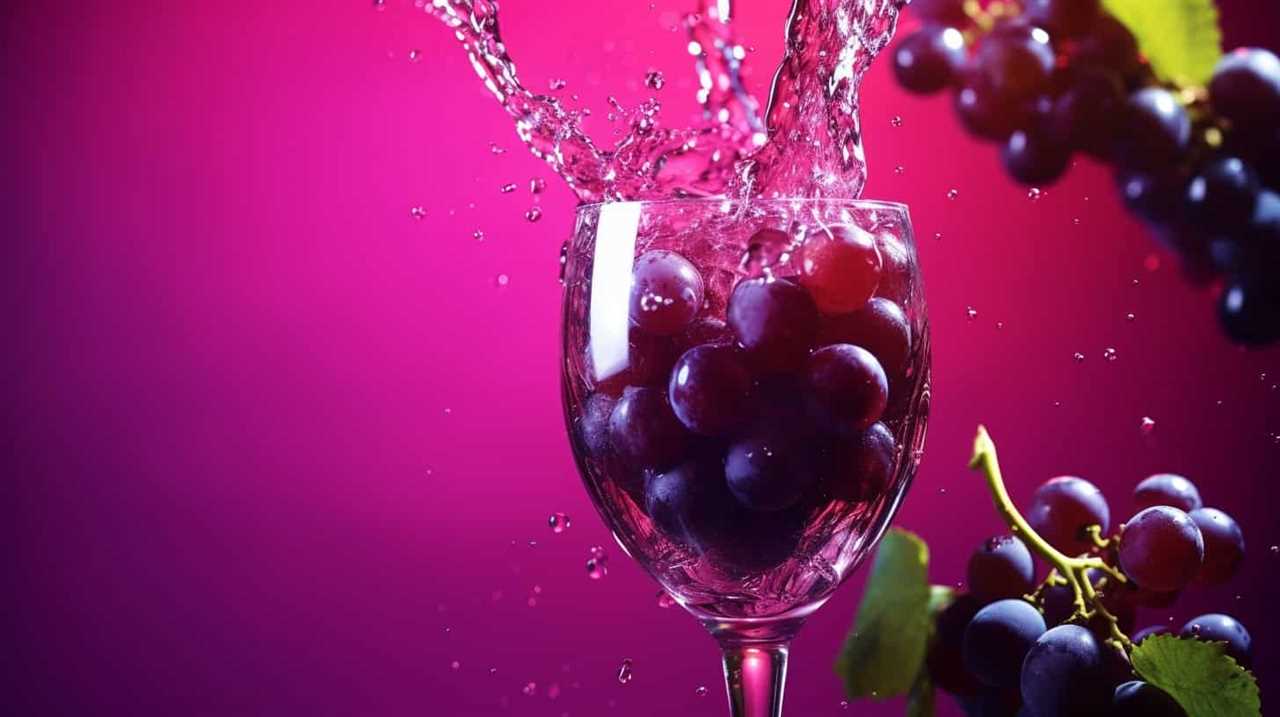
We’ve all been in that situation before – reaching for a glass of orange juice and hesitating, unsure if it’s still okay to drink. Fear not! This article will give you the knowledge you need to determine for sure if your orange juice is still fresh or if it’s gone bad.
With a blend of scientific precision and practical tips, we’ll explore color changes, strange smells, off taste, texture changes, and mold or growth that may indicate spoilage.
Let’s dive in and serve ourselves a refreshing glass of certainty!
Key Takeaways
- Color changes in orange juice can indicate a loss of freshness and shelf life extension, but it doesn’t necessarily mean the juice is bad.
- Unusual or off-putting odors in orange juice, such as sour or fermented scents, can be a sign of poor quality.
- An off taste in orange juice, such as sour, bitter, or fermented flavors, suggests that the juice is spoiled.
- Texture changes in orange juice, such as pulp separation or a thicker consistency, can occur as the juice ages, so it’s important to consume it before the expiration date.
Color Changes in Orange Juice
We should be aware that color changes can indicate whether orange juice is bad.
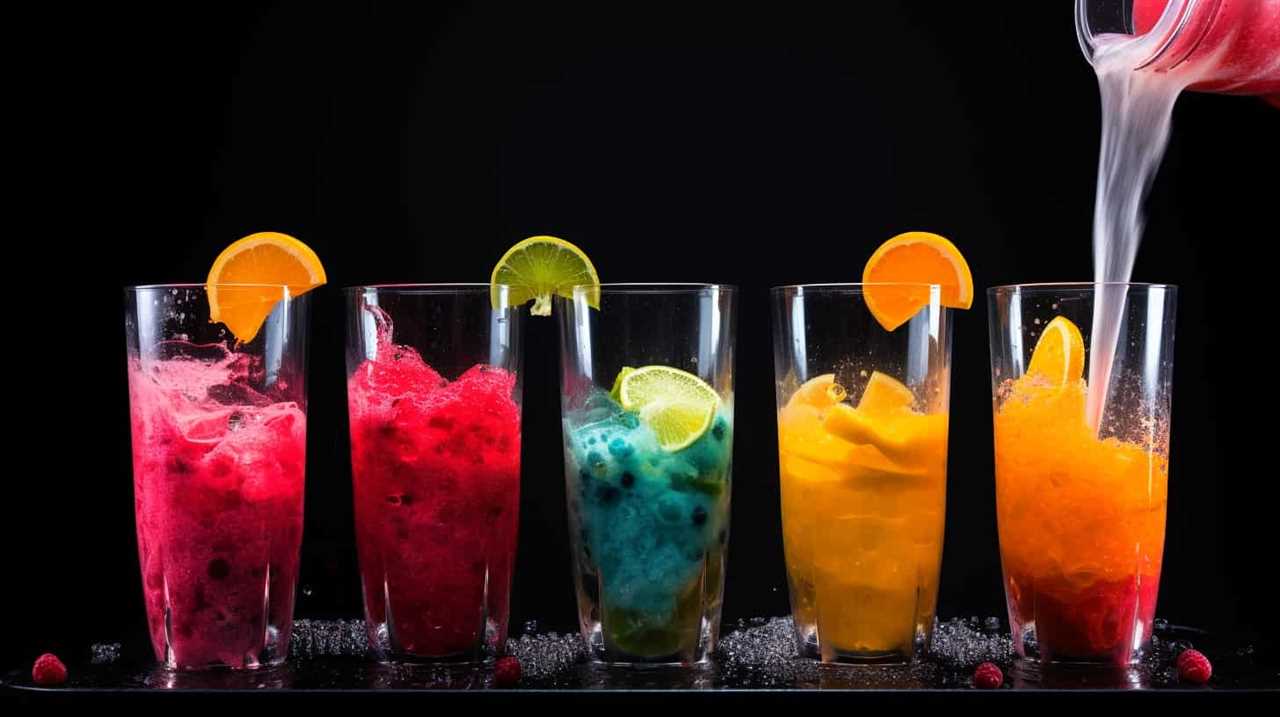
When it comes to orange juice, color is a crucial factor to consider. As oranges are exposed to air, an oxidation process occurs, which leads to changes in color. Fresh orange juice has a vibrant orange hue, indicating its freshness and high nutritional value.
However, as time passes, the juice may undergo a color change, turning dull or brownish. This change in color is a result of the oxidation process, which affects the flavor and quality of the juice. It’s important to note that while a change in color doesn’t necessarily mean the juice is bad, it does indicate that the juice is losing its freshness and shelf life extension.
Therefore, it’s advisable to consume orange juice when it’s at its freshest, as indicated by its vibrant orange color.
Strange Smells in Orange Juice
When it comes to evaluating orange juice, we should be cautious of any strange smells or odors. A fresh, pleasant smell is indicative of good quality orange juice. However, if you notice any unusual or off-putting odors, it may be a sign that the juice has gone bad. These smells can range from a sour or fermented scent to a rancid or moldy aroma.
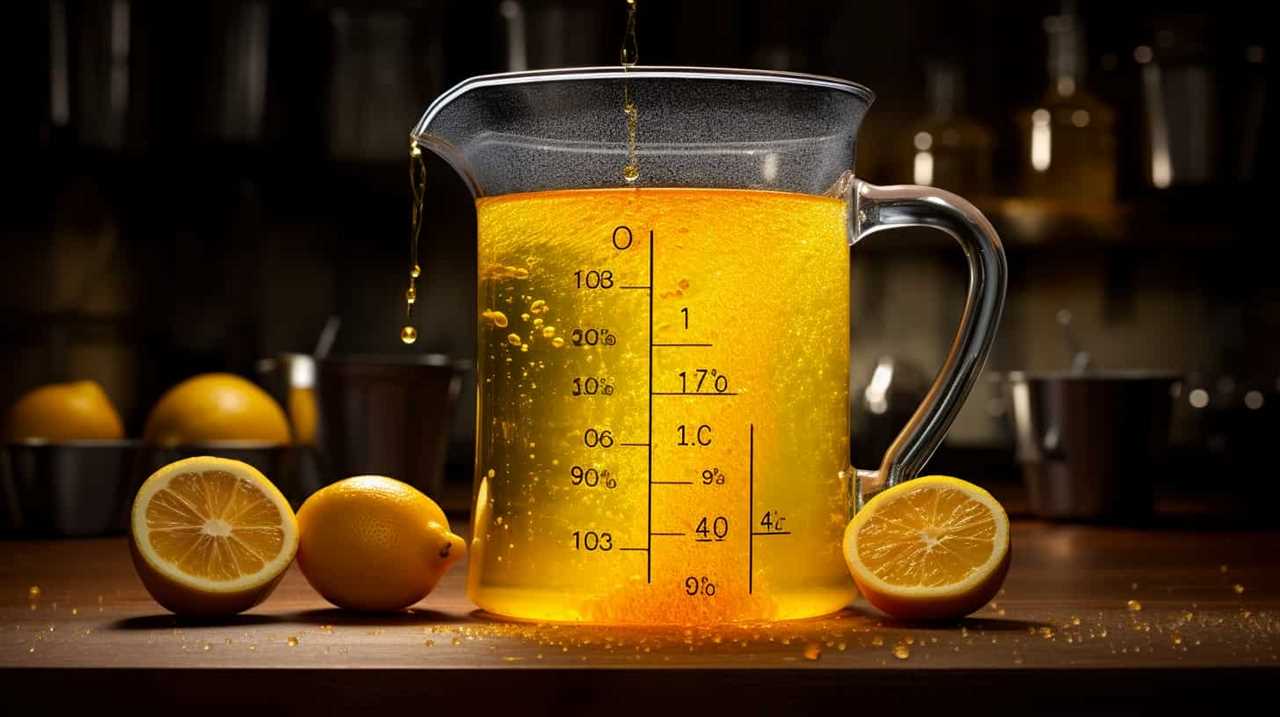
It’s important to note that while some natural variations in scent can occur due to the specific variety of oranges used, any strong or unpleasant smells should raise concerns. If you have citrus fruit allergies, it’s especially important to pay attention to the smell of orange juice, as it could indicate the presence of spoilage or contamination.
Ensuring the quality of orange juice is essential as it’s a popular beverage known for its health benefits, including being rich in vitamin C and antioxidants.
Off Taste of Orange Juice
Our taste buds can detect even the slightest hint of an off taste in orange juice, which can indicate that it has gone bad. The taste of orange juice should be fresh, tangy, and slightly sweet. If it tastes sour, bitter, or fermented, it’s likely spoiled.
One common cause of an off taste in orange juice is the use of overripe oranges. When oranges become overripe, their flavor profile changes, resulting in a less pleasant taste. Another factor to consider is the expiration date. Orange juice that has passed its expiration date is more likely to develop an off taste. It’s important to check the expiration date before consuming orange juice to ensure its freshness and quality. Additionally, improper storage conditions, such as leaving the juice at room temperature for extended periods, can lead to the development of unpleasant flavors. Storing orange juice in the refrigerator helps maintain its freshness for longer. For those exploring different juice options, aloe vera juice flavor tips suggest pairing tart juices with milder flavors to balance the overall taste.
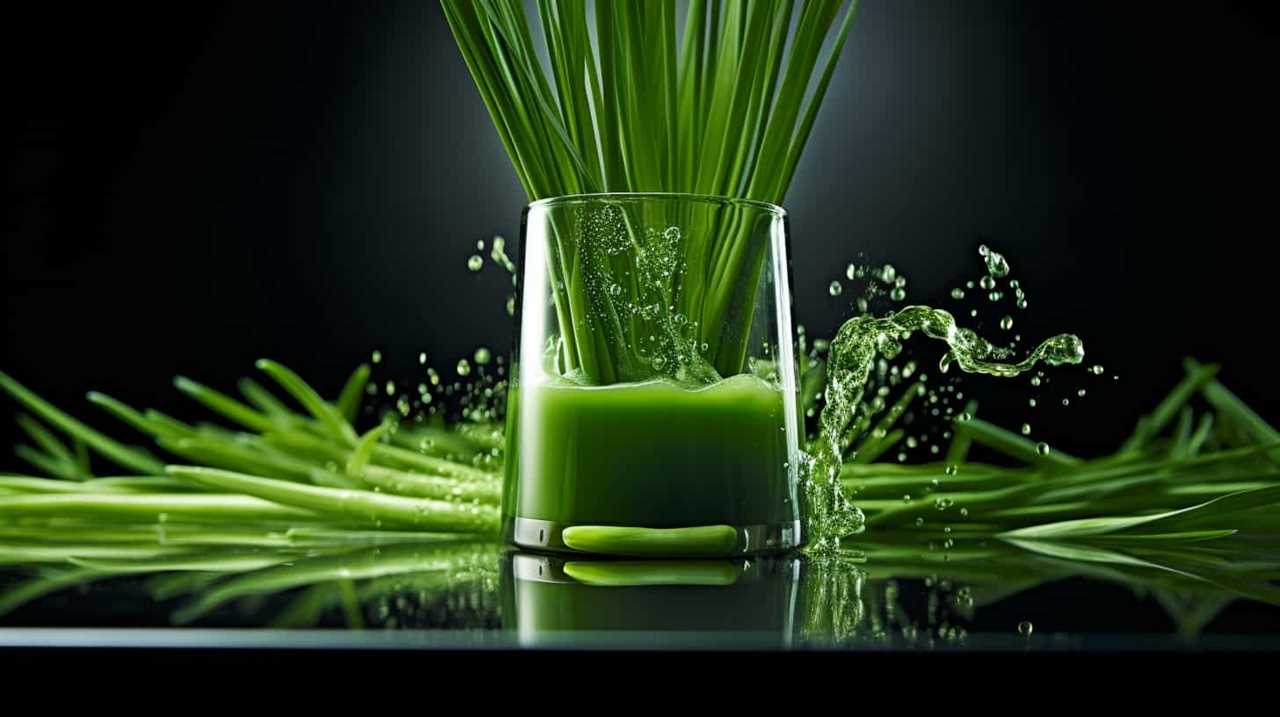
Now, let’s move on to discuss the texture changes in orange juice.
Texture Changes in Orange Juice
As we explore the texture changes in orange juice, it’s important to note that certain factors can cause it to become thicker or develop sediment. One common texture change in orange juice is pulp separation, where the pulp separates from the liquid and settles at the bottom. This can occur naturally over time, as the pulp particles become denser and sink.
Another factor that can affect the texture of orange juice is the expiration date. As orange juice ages, it may start to develop a thicker consistency and even form sediment. This is a result of the natural breakdown of the juice’s components. Therefore, it’s crucial to check the expiration date on orange juice and consume it before it reaches its expiration date to avoid any undesirable texture changes.
Mold or Growth in Orange Juice
We need to be aware of the possibility of mold or other growth occurring in orange juice. Mold can develop in orange juice if it isn’t stored properly or if it has passed its expiration date.
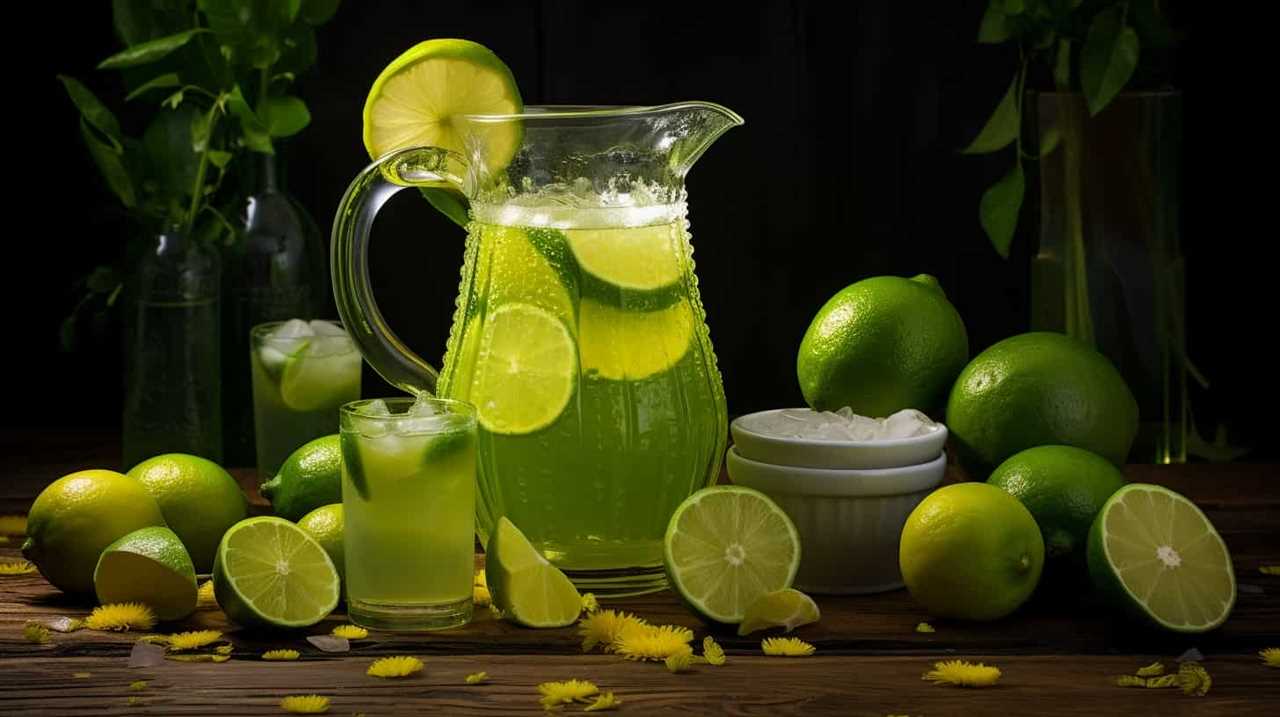
To prevent mold growth, it’s important to follow these steps:
- Store orange juice in the refrigerator at a temperature below 40°F (4°C).
- Check the expiration date on the bottle before consuming. Discard any orange juice that has expired.
- Keep the container tightly sealed to prevent air and moisture from entering, as these can promote mold growth.
Regularly inspecting orange juice for any signs of mold or unusual growth is essential. If you notice any discoloration, a strange odor, or visible mold, it’s best to discard the juice to avoid any potential health risks.
Frequently Asked Questions
Can Orange Juice Go Bad if It’s Stored in the Freezer for Too Long?
Frozen orange juice can potentially lose its nutrients and change its taste if stored in the freezer for too long. It is important to check for signs of spoilage before consuming it.
How Long Can Orange Juice Stay Fresh in the Refrigerator Once It’s Opened?
Once opened, orange juice can stay fresh in the refrigerator for about 7-10 days. To maintain its freshness, store it properly by keeping it tightly sealed and at a consistently cold temperature. If the orange juice develops an off odor, flavor, or appearance, it’s best to discard it to avoid any potential health risks. Factors like exposure to air and varying temperatures can influence how long orange juice lasts, so it’s crucial to handle it with care. Always check the expiration date as a general guide, but remember that proper storage can extend its freshness slightly. Additionally, avoid leaving the orange juice out at room temperature for extended periods, as this can significantly shorten how long orange juice lasts. Freezing the juice can be another option to extend its shelf life, but be aware that this may alter its texture and taste once thawed. By following these precautions, you can ensure your orange juice stays fresh and safe to consume.
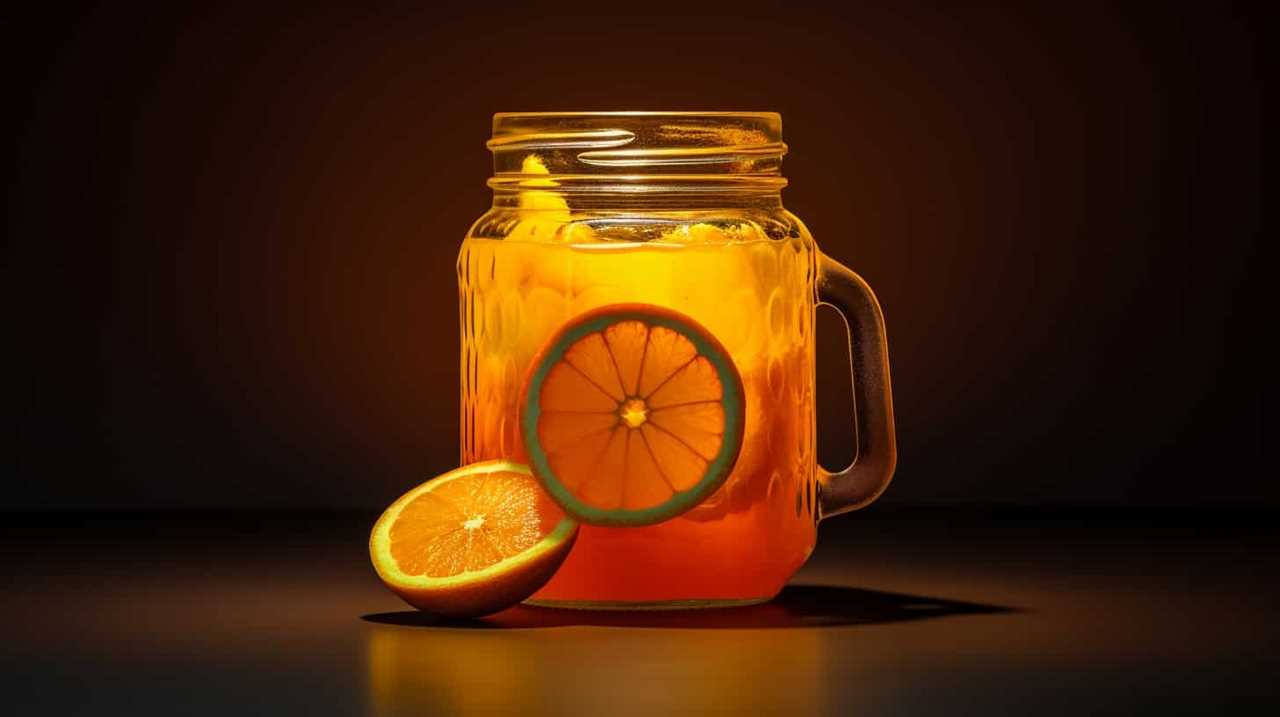
Is It Safe to Consume Orange Juice That Has Been Left Out at Room Temperature Overnight?
Left out orange juice may not be safe to drink as it can harbor harmful bacteria. Signs of spoiled orange juice include a sour smell, mold growth, and a change in color or taste.
Can Orange Juice Develop Harmful Bacteria if It’s Past Its Expiration Date but Still Looks and Smells Fine?
Orange juice can cause food poisoning if it develops harmful bacteria, even if it looks and smells fine. Signs of spoiled orange juice include a sour smell, mold growth, and a change in color or taste.
Does the Nutritional Value of Orange Juice Decrease as It Starts to Go Bad?
As orange juice goes bad, its nutritional value decreases. The longer it sits on the shelf, the more nutrients it loses. Signs of spoilage include a sour smell, off taste, and mold growth.
Conclusion
In conclusion, determining if orange juice is bad requires careful observation of color changes, strange smells, off taste, and texture changes. Just like a detective investigating a case, we must rely on our senses to detect any signs of spoilage.
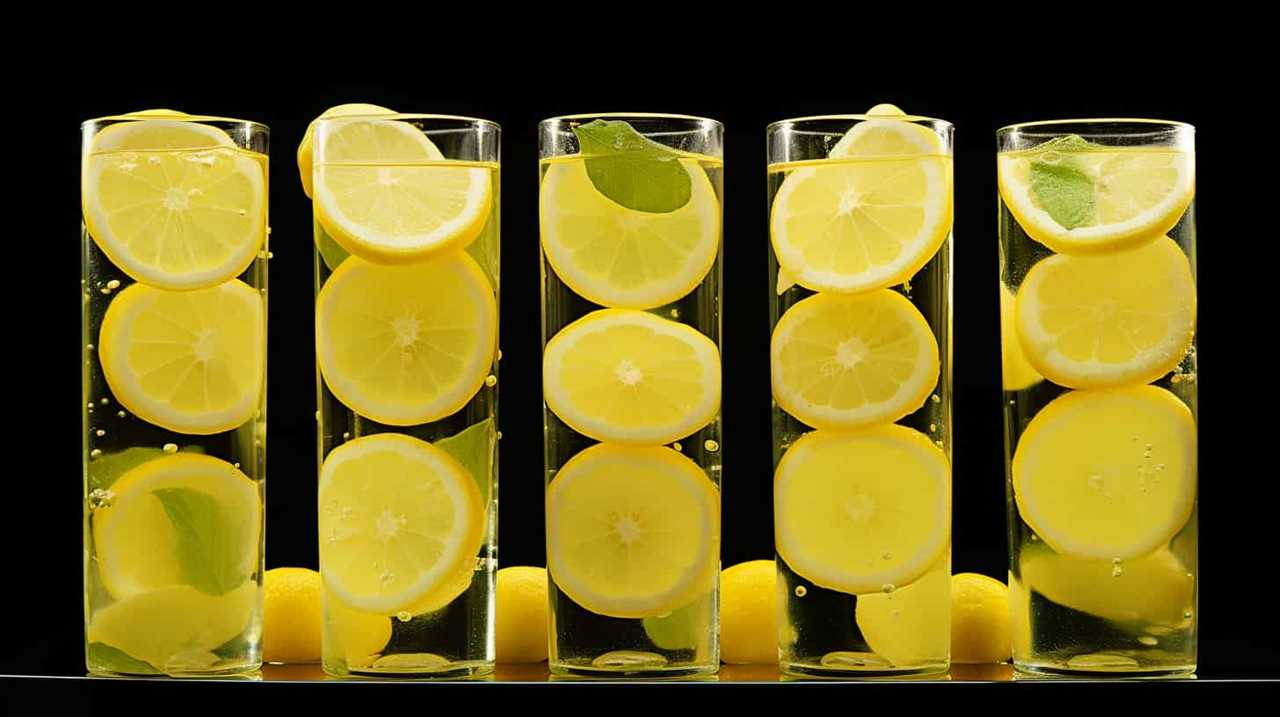
If we detect mold or growth in the orange juice, it’s a clear indication that it’s no longer safe to consume. By remaining vigilant and attuned to these indicators, we can ensure that our orange juice is always fresh and enjoyable.
Susannah expertise lies in researching and compiling evidence-based content on juicing, nutrition, and overall health. She is committed to ensuring that The Juicery World offers accurate, up-to-date, and trustworthy information to empower readers to take control of their health. Susannah’s goal is to inspire individuals to embrace juicing as a way to nourish their bodies and live their best lives.
-

 Vetted2 months ago
Vetted2 months ago15 Best Juices for Diabetics: Refreshing Options That Won’t Spike Your Blood Sugar
-

 Vetted2 months ago
Vetted2 months ago15 Best Decaf Coffee Options for Flavor Lovers Who Need a Caffeine Break
-

 Vetted2 months ago
Vetted2 months ago15 Best Espresso Ground Coffees to Elevate Your Morning Brew
-

 Vetted2 months ago
Vetted2 months ago15 Best K-Cup Coffee Pods for a Perfect Brew Every Time
-

 Vetted2 months ago
Vetted2 months ago15 Best Beans for Espresso: A Guide to Perfecting Your Brew
-

 Vetted2 months ago
Vetted2 months ago15 Best Kona Coffees to Savor the Rich Flavors of Hawaii
-

 Vetted2 months ago
Vetted2 months ago15 Best Cold Brew Coffees to Keep You Refreshed All Summer Long
-

 Vetted2 months ago
Vetted2 months ago15 Best Inexpensive Espresso Machines That Brew Quality Coffee on a Budget


